Play in a Pandemic
Guest post by Susie Robbins from Resolve to Play
Did you know that play is considered to be so important that it is listed in the United Nations Declaration on the Rights of the Child, Article 31? It reads: “Every child has the right to rest and leisure, to engage in play and recreational activities appropriate to the age of the child”.

Play under ‘normal’ conditions supports our development. It helps to grow our communication and language skills, build our relationships and manage emotions. It encourages our critical thinking and problem solving, our teamwork, and cognitive development. Play, amid this global crisis, is more important than ever. As parents we need to allow our children plenty of time to free-play, play with no agenda or no hidden learning outcomes.
You might see your child playing in a way that they had previously considered to be ‘babyish’; regression during difficult circumstances is normal and will pass. You will probably see your child playing schools, if they are already in an educational setting, and this is their way of remembering all the routines that they had learnt.
If you find it difficult to play with your child, you are not alone! Being bossed around by a five-year-old ‘doctor’ who insists that you will “never, ever get better from your curly nose disease” isn’t heaps of fun. But, can you manage it for five fully-focussed minutes? Set a timer if it helps to bring an end to play without sadness or bad-feeling and put your phone away, turn off the TV and get down to your child’s level.
When they ask, “Will you play with me?” it is a call for a connection, that connection can be achieved in only a few minutes of face-to-face play. Your child will then feel loved and valued and is likely to continue playing independently.
When they ask, “Will you play with me?” it is a call for a connection
If you are a parent who is working from home, some play might be too noisy or boisterous, particularly if you are on a conference call or working towards a deadline. Don’t be afraid to use screen-time if you require 30mins quiet time, but set a limit and stick to it. Don’t be tempted to eke out this window of opportunity, as screens will only be effective as long as they are a novelty.
Open-ended toys like building blocks, dolls or figurines are also a winner when it comes to play that lasts a little bit longer, but do remember that a neuro-typical child can only be expected to play independently for 1-5mins for every year of their age. A four-year-old might be able to play for up to 20mins, even longer if supported, but please don’t expect to be able to work from 9-5pm with only a few short breaks!
Young children demand attention, and breaking up your day into time spent playing, being outside, reading etc, will help to structure both your day and theirs, allowing flow and fun too.